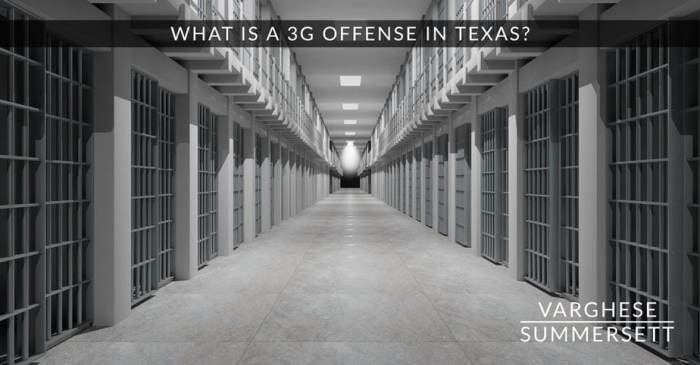What is a 3G offense in Texas? This article delves into the classification, elements, sentencing guidelines, and legal defenses surrounding 3G offenses in the state of Texas. Read on to gain a comprehensive understanding of this serious offense and its implications.
3G offenses, classified as third-degree felonies in Texas, encompass a range of serious crimes. These offenses often involve conduct that poses a significant risk to public safety and carry substantial penalties.
Overview of 3G Offenses in Texas: What Is A 3g Offense In Texas

In the Texas Penal Code, 3G offenses represent a specific category of criminal violations classified as “third-degree felonies.” These offenses are considered serious and carry significant penalties, including imprisonment and fines.G offenses encompass a wide range of criminal activities, including drug offenses, theft, and assault.
The classification of an offense as a 3G felony is based on factors such as the severity of the crime, the potential harm caused to victims, and the offender’s intent.
Examples of 3G Offenses
The following are some examples of offenses that fall under the 3G classification in Texas:
- Possession of a controlled substance (penalty group 1)
- Theft of property valued at $30,000 or more
- Aggravated assault with a deadly weapon
- Burglary of a habitation
- Evading arrest with a motor vehicle
Elements of a 3G Offense
Establishing a 3G offense in Texas requires proving specific elements:
1. Intentional or Reckless Conduct: The defendant must have acted intentionally or recklessly in causing the harm.
Intent
Intent refers to the defendant’s state of mind. In 3G offenses, the prosecution must prove that the defendant intended to cause the harm or was aware of a substantial risk of harm and acted recklessly.
Sentencing Guidelines for 3G Offenses

Sentencing for 3G offenses in Texas is determined by a range of factors, including the severity of the offense, the defendant’s criminal history, and any mitigating circumstances.
A 3g offense in Texas is a serious matter. It can result in jail time, fines, and a permanent criminal record. If you are facing a 3g offense, it is important to speak to an attorney immediately. One of the best ways to prepare for your case is to study the Saxon Algebra 1 Third Edition . This book will help you understand the legal concepts that apply to your case and will give you the tools you need to defend yourself effectively.
A 3g offense is a serious matter, but it is not insurmountable. With the right preparation, you can get through this and move on with your life.
The range of penalties for 3G offenses in Texas is as follows:
- First-degree felony:5 to 99 years in prison and a fine of up to $10,000
- Second-degree felony:2 to 20 years in prison and a fine of up to $10,000
- Third-degree felony:2 to 10 years in prison and a fine of up to $10,000
The court will consider a number of factors when determining the appropriate sentence for a 3G offense, including:
- The severity of the offense
- The defendant’s criminal history
- Any mitigating circumstances
Mitigating circumstances are factors that may reduce the severity of the offense or the defendant’s culpability. These may include factors such as the defendant’s age, mental health, or lack of prior criminal history.
Legal Defenses to 3G Offenses

Defenses against 3G offenses often focus on challenging the prosecution’s evidence or raising affirmative defenses.
Burden of Proof, What is a 3g offense in texas
The prosecution bears the burden of proving every element of the offense beyond a reasonable doubt. This includes proving the defendant’s identity, the occurrence of the offense, and the defendant’s mental state.
Challenging the Prosecution’s Evidence
Defendants may challenge the prosecution’s evidence by:
- Objecting to its admissibility on grounds such as relevance, hearsay, or chain of custody.
- Cross-examining witnesses to highlight inconsistencies or bias.
- Presenting expert testimony to counter the prosecution’s experts.
Affirmative Defenses
Affirmative defenses admit the elements of the offense but provide a justification or excuse for the defendant’s actions. Common affirmative defenses in 3G offense cases include:
Self-defense
The defendant reasonably believed that deadly force was necessary to protect themselves or others from imminent harm.
Defense of others
The defendant reasonably believed that deadly force was necessary to protect another person from imminent harm.
Intoxication
The defendant was intoxicated to the point that they lacked the capacity to form the specific intent required for the offense.
Insanity
The defendant suffered from a severe mental illness that prevented them from understanding the nature and consequences of their actions.
Case Studies and Notable Precedents

In Texas, several cases and precedents have shaped the application and interpretation of 3G offense laws. These cases provide guidance to prosecutors and defense attorneys alike, establishing legal principles that impact future prosecutions.
State v. Hernandez
In State v. Hernandez, the Texas Court of Criminal Appeals held that the offense of “possession of a controlled substance with intent to deliver” under 3G is a specific intent crime. This means that the prosecution must prove that the defendant intended to deliver the controlled substance to another person.
State v. Robinson
In State v. Robinson, the Texas Court of Criminal Appeals ruled that the offense of “manufacture or delivery of a controlled substance” under 3G requires the prosecution to prove that the defendant actually manufactured or delivered the controlled substance. Mere possession of the substance is not sufficient to establish guilt.
Recent Developments and Trends

The prosecution and defense of 3G offenses in Texas have witnessed notable changes in recent years. These developments have significant implications for the legal landscape surrounding these offenses and may influence future cases.
One significant trend is the increased use of technology in both prosecution and defense strategies. Prosecutors are increasingly relying on digital evidence, such as social media posts, text messages, and GPS data, to build their cases. Defense attorneys, on the other hand, are using technology to challenge the prosecution’s evidence and present their own evidence in support of their clients.
Changes in Sentencing Guidelines
Another recent development is the change in sentencing guidelines for 3G offenses. In 2021, the Texas Legislature passed a bill that reduced the mandatory minimum sentence for certain 3G offenses, such as possession of marijuana. This change has had a significant impact on the sentencing of individuals convicted of these offenses, resulting in shorter sentences and more opportunities for probation.
Query Resolution
What are the common examples of 3G offenses in Texas?
Examples of 3G offenses include aggravated assault, burglary of a habitation, and possession of a controlled substance.
What is the range of penalties for 3G offenses?
Penalties for 3G offenses range from 2 to 10 years in prison and fines up to $10,000.
What are some common legal defenses to 3G offenses?
Common legal defenses include self-defense, lack of intent, and insufficient evidence.
